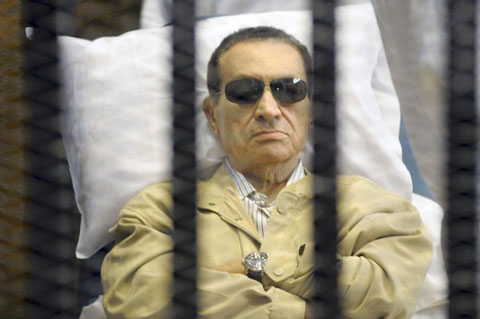
Former Egyptian President Hosni Mubarak, propped on a hospital bed, appears in court to hear the verdict and sentencing. His last interior minister, Habib Adli, was also sentenced to life in prison for the killings of demonstrators between Jan. 25 and Feb. 11, 2011. (Associated Press)
After a 10 month trial, Egyptian Judge Ahmed Rifaat began the sentencing session of former President Hosni Mubarak with strong words, “The people released a collective sigh of relief after a nightmare that did not last for a night, but for almost 30 black, black, black years — darkness that resembled a winter night…They did not seek a luxurious life or to sit atop the world, but asked their politicians, rulers who sat on the throne of opulence, wealth and power to give them bread and clear water to satisfy their hunger and quench their thirst and to be in a home that shelters their families and the sons of the nation far from the rotten slums.”
According to the Associated Press, “Mubarak, the first Arab leader to be tried in his own country, remained silent inside the court cage while his once-powerful sons appeared nervous and had dark circles under their eyes. His elder son Alaa whispered verses from the Quran.”
The verdict:
Deposed President Hosni Mubarak who ruled Egypt for nearly 30 years and his interior minister Habib el-Adly were sentenced to life in prison on Saturday for not failing to stop the deaths of nearly 1,000 protesters during the uprising that led to Mubarak’s ouster in 2011.
Five others, including onetime chief of security forces, were acquitted on the killings, triggering widespread protests across Egypt. “They saw the sentence and the acquittal of senior police officers as proof that the old regime still wields influence and feared Mubarak could now be acquitted on appeal,” Reuters.
Mubarak and his two sons Gamal and Alaa Mubarak – who remain in custody on separate charges of stock market fraud – were acquitted of corruption charges, the judges cited a statute of limitations because of a 10year lapse since the crimes had taken place.
The reaction:
The Washington Post reports: “Activists said the verdicts mean that no one has been held directly accountable for killing the nearly 1,000 people who died during the revolt. Mubarak and former interior minister Habib al-Adli were convicted for failing to stop the killings, not for ordering them.”
Anti-Mubarak protesters like Mohamed Atyan were bitterly unsatisfied with the verdict, reports The Guardian, “This isn’t a verdict – Mubarak is a dead man anyway but the others need to be executed 10 times over…. we must go back to our spiritual home, Tahrir Square.”
Prison
Mubarak was flown by helicopter from the police academy where the trial was held to the Torah prison in Cairo where he’ll be serving his life sentence. The Washington Post elaborates, “The former strongman reportedly suffered a heart attack after learning that he would not be returned to the military hospital where he has been held in recent months, according to a medical official who spoke on the condition of anonymity. As the aircraft touched down, Mubarak reportedly wept and refused for several minutes to debark. State media reported he was in stable condition Saturday night in the prison.”
Video:
Related articles:
—————————
Be a fan of Dunia on FACEBOOK
—————————
Participate in a Dunia POLL
—————————
Join our mailing list for your free monthly newsletter
